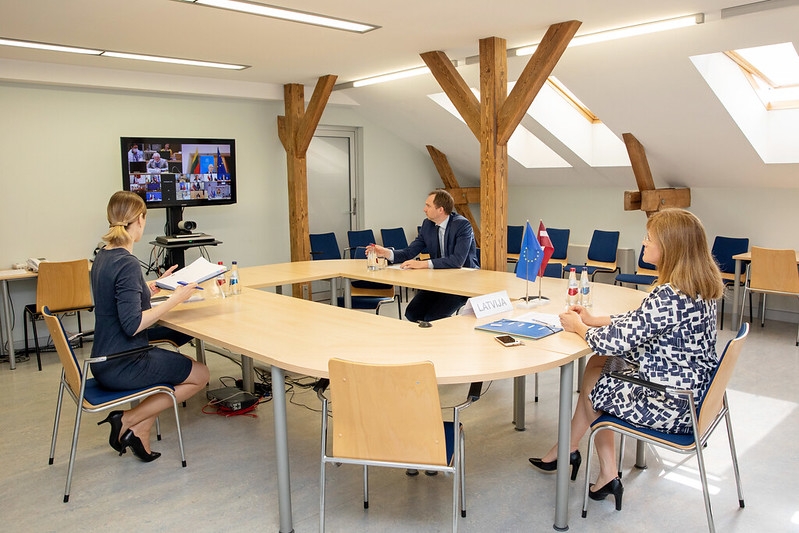On 8 June 2020, the Parliamentary Secretary of the Latvian Foreign Ministry, Zanda Kalniņa-Lukaševica, took part in the informal meeting of EU Development Ministers via video conference to discuss the EU’s global interests and support for partner countries in addressing the challenges and consequences of the COVID-19 pandemic and to facilitate recovery around the world.
Ministers talked about what has been achieved so far in offering support to developing countries and what still needs to be done. Member States recognised that the support rendered should be available in a fair and equitable manner. At the same time, the process of recovery should be all inclusive and all opportunities should be used to facilitate digitalisation and sustainable development. The Council also talked about how the Member States should be working to effectively communicate and illustrate the success of the European Union in development assistance already given, as well as being sure to fight against disinformation in each country taking into account the European Union’s leading role to support such efforts.
During the conference, Zanda Kalniņa-Lukaševica pointed out that the process of recovery in Europe provides an opportunity to come back better and greener than before. Latvia is ready to contribute to partner countries with its potential for finding the best solutions. For example, Latvia has just released the Apturi Covid (Stop COVID) app. The crisis has demonstrated that civil society, the private sector and the local community play a decisive role in dealing with both social and economic challenges And so, it’s important to maintain support for their work. And it’s also important to strengthen EU activities in the fight against disinformation related to COVID-19. Coordinated, timely, fact-based information should be available and accessible both in the EU and in countries that are the recipients of EU help and assistance.
During the discussion, attention was devoted to strengthening multilateralism and the coordination of international support through the United Nations and international financial institutions including the European Investment Bank, the European Bank for Reconstruction and Development, and the World Bank. The Development Ministers also exchanged opinions and were informed about the process of recovery, ensuring investment and easing of the debt burden, and on the course toward the future financial architecture for sustainable development.
The World Bank predicts that in 2020 the pandemic and the economic crisis it created shall this year can push 60 million residents of developing countries into poverty. The Council recognised that ensuring deliveries of food shall be one of the biggest challenges and so Ministers also talked about ways to avoid the risk of a “hunger pandemic” that could come as a result of the COVID-19 crisis.
In order to provide harmonised and coordinated EU assistance in the fight against COVID-19, the European Commission launched the "Team Europe" initiative on 8April 2020 to support EU partner countries in the fight against the COVID-19 pandemic and its consequences together with support of European development banks.
Currently, "Team Europe" has announced almost 36 billion euro along with 7 billion euro in the context of the neighbourhood policy for the socio-economic and health sectors that have now been mobilised and will be used to address the devastating effects of the COVID-19 crisis in partner countries and regions. This financing is for the most part realised through re-orientation of existing financial instruments, taking into account the current priorities and needs of the developing countries, and the effort at protecting the lives and livelihoods of all people there.
Latvia, as a part of Team Europe, has also re-oriented development assistance resources and funding in order to support countries of the EU’s Eastern Partnership and Central Asia, offering immediate help for solutions to questions arising from the COVID-19 pandemic in the socio-economic and health sectors. At the same time, Latvia is continuing to support the reform processes in these countries.
The European Council today approved a number of conclusions, including on the "Team Europe" package that is part of the EU's global response to the COVID-19 pandemic and for facilitating the renewal and recovery of the socio-economic sector in developing countries.
Taking into account the negative economic effects and the drops in employment occurring in the wake of the COVID-19 pandemic and the severe impact it is expected to have on young people, especially those from disadvantaged backgrounds, the Council also adopted conclusions on the role of youth in external action, stressing the pivotal importance of investing in and working with, by and for youth; harnessing the creative and innovative potential and abilities of youth by ensuring access to decent jobs and quality education; guaranteeing meaningful inclusion and active participation at all levels of society; and thereby giving young people opportunities to improve their socio-economic status, move out of poverty and enjoy all human rights.





